
actions
AI Actions connect Agents to your existing enterprise systems and applications - all in 🐍 Python.
Stars: 109
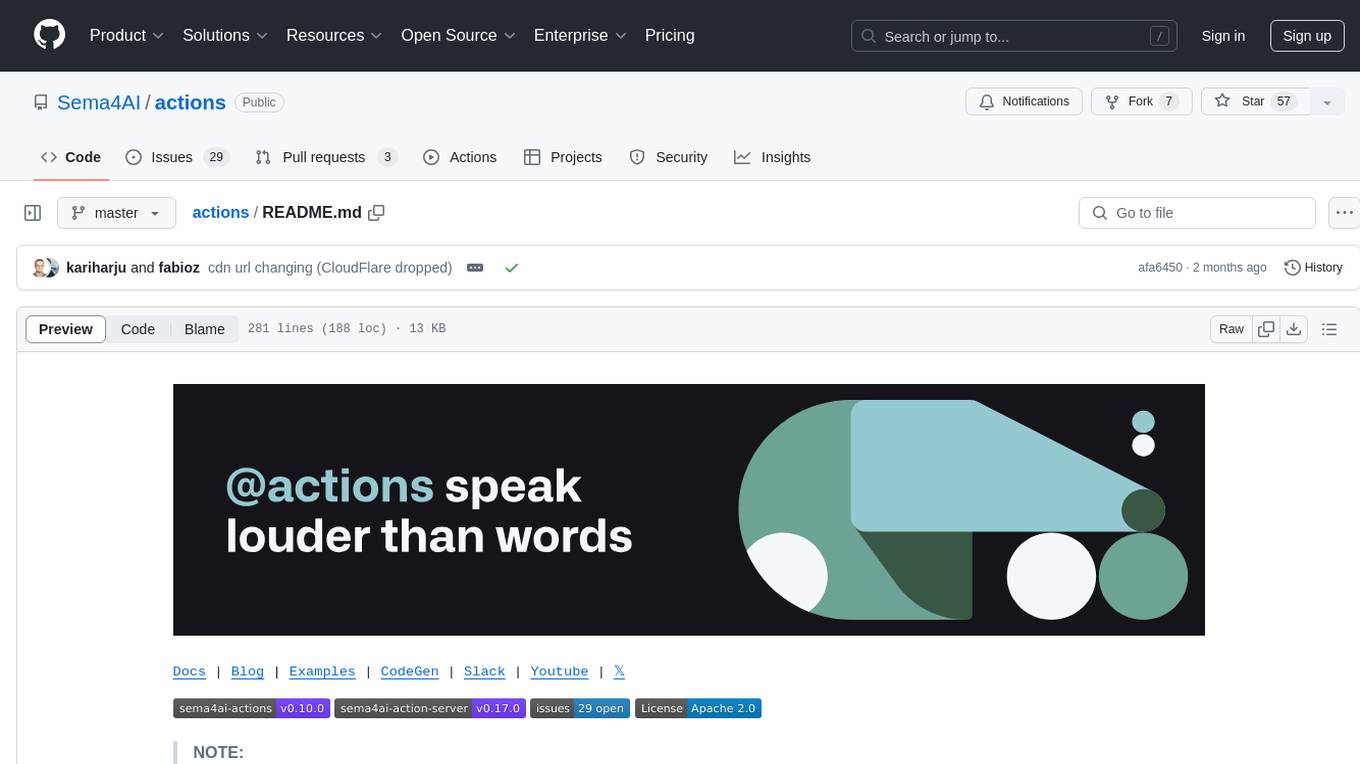
Sema4.ai Action Server is a tool that allows users to build semantic actions in Python to connect AI agents with real-world applications. It enables users to create custom actions, skills, loaders, and plugins that securely connect any AI Assistant platform to data and applications. The tool automatically creates and exposes an API based on function declaration, type hints, and docstrings by adding '@action' to Python scripts. It provides an end-to-end stack supporting various connections between AI and user's apps and data, offering ease of use, security, and scalability.
README:
Docs | Blog | Examples | CodeGen | Slack | Youtube | 𝕏
NOTE:
This project started as Robocorp Action Server, and is currently being migrated under Sema4.ai organization. You will still likely find links to Robocorp resources. It's all the same company!
Sema4.ai is the easiest way to extend the capabilities of AI agents, assistants and copilots with custom actions, written in Python. Create and deploy tools, skills, loaders and plugins that securely connect any AI Assistant platform to your data and applications.
Sema4.ai Action Server makes your Python scripts compatible with e.g. OpenAI's custom GPTs, LangChain and OpenGPTs by automatically creating and exposing an API based on function declaration, type hints and docstrings. Just add @action and start!

There are two main ways using the Action Server: use the command line, or with our VS Code extension. This section gets you going!
CLI For macOS
brew update
brew install sema4ai/tools/action-serverCLI For Windows
# Download Sema4.ai Action Server
curl -o action-server.exe https://cdn.sema4.ai/action-server/releases/latest/windows64/action-server.exeYou can download/move the executable into a folder that is in your PATH, or you can add the folder into PATH so that you can call action-server wherever you are.
CLI For Linux
# Download Sema4.ai Action Server
curl -o action-server https://cdn.sema4.ai/action-server/releases/latest/linux64/action-server
chmod a+x action-server
# Add to PATH or move to a folder that is in PATH
sudo mv action-server /usr/local/bin/Robocorp Code extension for VS Code
NOTE:
Robocorp VS Code extension is in the process to be renamed to Sema4.ai extension.
After installing Robocorp Code extension from the VS Code Markeplace, open the Command Palette (Command-Shift-P or Ctrl-Shift-P) and select Robocorp: Create Action Package. This will bootstrap a new project. You can then run/debug indvidual Actions from the Extension's sidebar, or start the Action Server.
Bootstrap a new project from a template. You’ll be prompted for the name of the project:
action-server newNavigate to the freshly created project folder and start the server:
cd my-project
action-server start --expose👉 You should now have an Action Server running locally at: http://localhost:8080, to open the web UI.
👉 Using the --expose -flag, you also get a public internet-facing URL (something like twently-cuddly-dinosaurs.sema4ai.link) and an API key. These are the details that you need to configure your AI Agent.
Head over to Action Server docs for more.
1️⃣ package.yaml file that describes the set of Actions your are working on, and defines up your Python environment and dependencies:
name: Package name
description: Action package description
documentation: https://github.com/...
dependencies:
conda-forge:
- python=3.10.12
- uv=0.1.37
pypi:
- sema4ai-actions=0.3.1
- pytz=2024.1🙋♂️ "Why not just pip install...?"
Think of this as an equivalent of the requirements.txt, but much better. 👩💻 With package.yaml you are not just controlling your PyPI dependencies, you control the complete Python environment, which makes things repeatable and easy.
👉 You will probably not want run the Actions just on your machine, so by using package.yaml:
- You can avoid
Works on my machine-cases - You do not need to manage Python installations on all the machines
- You can control exactly which version of Python your automation will run on
- ..as well as the pip version to avoid dependency resolution changes
- No need for venv, pyenv, ... tooling and knowledge sharing inside your team.
- Define dependencies in package.yaml let our tooling do the heavy lifting.
- You get all the content of conda-forge without any extra tooling
The environment management is provided by another open-source project of ours, RCC.
2️⃣ @action decorator that determines the action entry point and Type hints and docstring to let AI agents know what the Action does in natural language.
@action
def greeting(name: str) -> str:
"""
Greets the user
Args:
name (str): The user name
Returns:
str: Final user greeting
"""Once you have started the Action Server with --expose flag, you’ll get a URL available to the public, along with the authentication token. The relevant part of the output from the terminal looks like this, of course with your own details:
...
Uvicorn running on http://localhost:8080 (Press CTRL+C to quit)
🌍 URL: https://seventy-six-helpless-dragonflies.sema4ai.link
🔑 Add following header api authorization header to run actions: { "Authorization": "Bearer xxx_xxx" }Adding the Action Server-hosted AI Action to your custom GPT is super simple: basically just navigate to “Actions” section of the GPT configuration, add the link to import the actions, and Add Authentication with Authentication method set to “API key” and Auth Type to “Bearer”.
TIP:
Use the@action(is_consequential=False)flag to avoid the user needing to accept the action execution separately each time on your GPT.
Add Action Server as a Toolkit to 🦜️🔗 LangChain
NOTE:
This section is still under Robocorp, but pending rename to Sema4.ai soon.
Sema4.ai Action Server has everything needed to connect it to your Langchain AI app project. The easiest way is to start with the template provided in the Langchain project. Here’s how to do it:
# Install LangChain cli tool if not already there
pip install langchain-cli
# Create a new LangChain app using Action Server template
langchain app new my-awesome-app --package robocorp-action-serverThen define the route inside the created ./my-awesome-app/app/server.py file:
from langserve import add_routes
+ from robocorp_action_server import agent_executor as action_server_chain
# Edit this to add the chain you want to add
- add_routes(app, NotImplemented)
+ add_routes(app, action_server_chain, path="/robocorp-action-server")After the setup make sure you have:
- An environment variable
OPENAI_API_KEYwith your OpenAI API key set - You have a running Action Server at http://localhost:8080
Finally, inside the project directory ./my-awesome-app spin up a LangServe instance directly by:
langchain serveAfter running the steps above, you’ll have a Playground available at http://127.0.0.1:8000/robocorp-action-server/playground/ where you can test your Actions with an AI agent.
Want to build your own thing? Adding your Robocorp AI Actions to a Langchain project is as easy as the code below. Just remember to change the URL of the Action Server if you are not running both the Action Server and Langchain app on the same machine.
from langchain_robocorp import ActionServerToolkit
# Initialize Action Server Toolkit
toolkit = ActionServerToolkit(url="http://localhost:8080")
tools = toolkit.get_tools()- ❤️ “when it comes to automation, the (ex)Robocorp suite is the best one” /u/disturbing_nickname
- ❤️ “(ex)Robocorp seems to be a good player in this domain” /u/thankred
- ❤️ “Since you know Python, check out (ex)Robocorp. Their product is crazy good.” /u/Uomis
Sema4.ai stack is hands down the easiest way to give AI agents more capabilities. It’s an end-to-end stack supporting every type of connection between AI and your apps and data. You are in control where to run the code and everything is built for easiness, security, and scalability.
- 🔐 Decouple AI and Actions that touches your data/apps - Clarity and security with segregation of duties between your AI agent and code that touches your data and apps. Build
@actionand use from multiple AI frameworks. - 🏎️ Develop Actions faster with Sema4.ai's
robocorpautomation libraries - Robocorp libraries and the Python ecosystem lets you act on anything - from data to API to Browser to Desktops. - 🕵️ Observability out of the box - Log and trace every
@actionrun automatically without a singleprintstatement. Pro tip: connect LangSmith traces with Action logs! - 🤯 No-pain Python environment management - Don't do this. Sema4.ai manages a full Python environment for your actions with ease.
- 🚀 Deploy with zero config and infra - One step deployment, and you'll be connecting your
@actionto AI apps like Langchain and OpenAI GPTs in seconds.
Check out these example projects for inspiration.
- 🐣 Simplest possible AI Action
- 🤡 Get a random joke or jokes per theme. Showcases how easy it is to work with APIs.
- 🕸️ Open a local Playwright browser and make some Google searches.
- 🖥️ Securely fetch contents of
.txtand.pdffiles from your local machine's folder in real time. - 📝 Read and write with local Excel file.
Build more @actions and be awesome! We'd love to hear and see what have you built. Join our Slack community to share your work.
⭐️ First, please star the repo - your support is highly appreciated!
- 🚩 Issues – our GitHub Issues is kept up to date with bugs, improvements, and feature requests
- 🙋 Help - you are welcome to join our Community Slack if you experience any difficulty getting setup
- 🌟 Contribution and recognition – Start here, PR's are welcome!
- 🔐 Refer to our Security policy for details
For Tasks:
Click tags to check more tools for each tasksFor Jobs:
Alternative AI tools for actions
Similar Open Source Tools

actions
Sema4.ai Action Server is a tool that allows users to build semantic actions in Python to connect AI agents with real-world applications. It enables users to create custom actions, skills, loaders, and plugins that securely connect any AI Assistant platform to data and applications. The tool automatically creates and exposes an API based on function declaration, type hints, and docstrings by adding '@action' to Python scripts. It provides an end-to-end stack supporting various connections between AI and user's apps and data, offering ease of use, security, and scalability.

robocorp
Robocorp is a platform that allows users to create, deploy, and operate Python automations and AI actions. It provides an easy way to extend the capabilities of AI agents, assistants, and copilots with custom actions written in Python. Users can create and deploy tools, skills, loaders, and plugins that securely connect any AI Assistant platform to their data and applications. The Robocorp Action Server makes Python scripts compatible with ChatGPT and LangChain by automatically creating and exposing an API based on function declaration, type hints, and docstrings. It simplifies the process of developing and deploying AI actions, enabling users to interact with AI frameworks effortlessly.
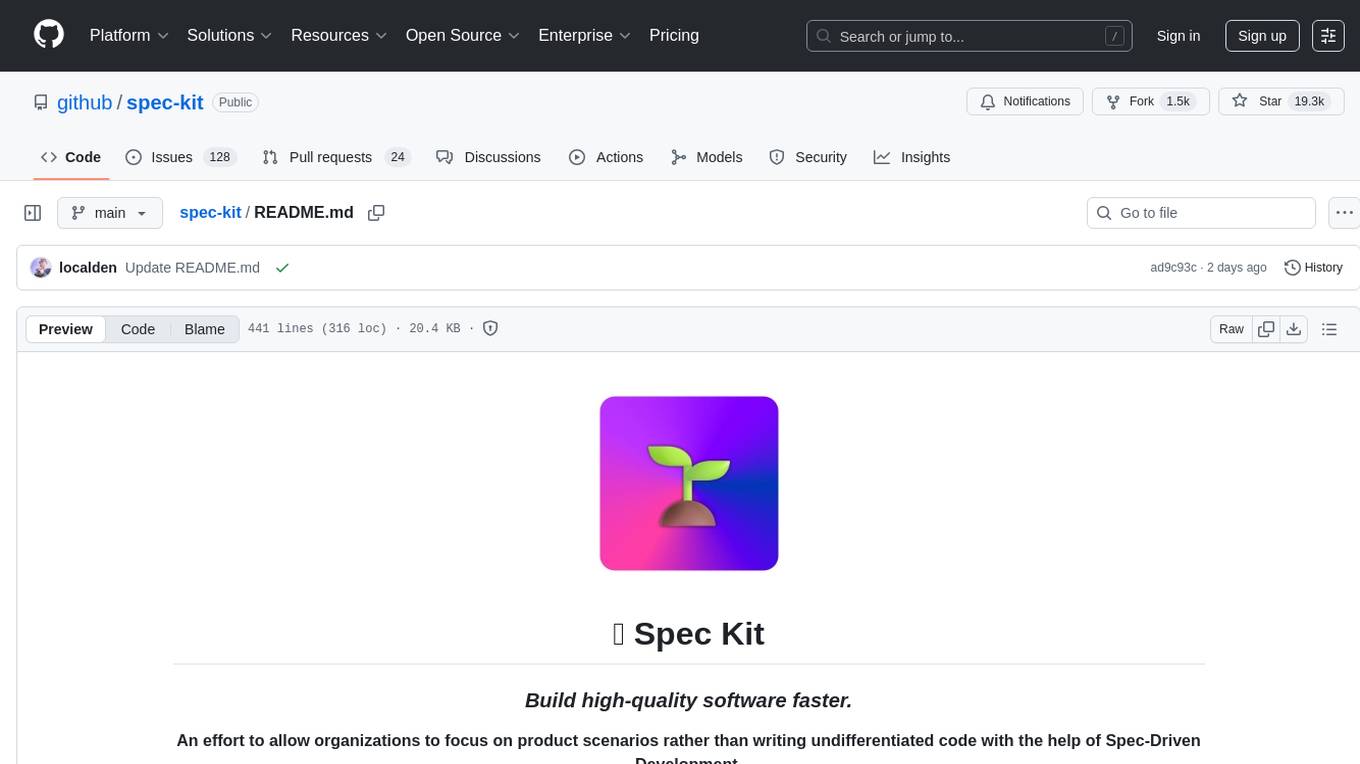
spec-kit
Spec Kit is a tool designed to enable organizations to focus on product scenarios rather than writing undifferentiated code through Spec-Driven Development. It flips the script on traditional software development by making specifications executable, directly generating working implementations. The tool provides a structured process emphasizing intent-driven development, rich specification creation, multi-step refinement, and heavy reliance on advanced AI model capabilities for specification interpretation. Spec Kit supports various development phases, including 0-to-1 Development, Creative Exploration, and Iterative Enhancement, and aims to achieve experimental goals related to technology independence, enterprise constraints, user-centric development, and creative & iterative processes. The tool requires Linux/macOS (or WSL2 on Windows), an AI coding agent (Claude Code, GitHub Copilot, Gemini CLI, or Cursor), uv for package management, Python 3.11+, and Git.

cognita
Cognita is an open-source framework to organize your RAG codebase along with a frontend to play around with different RAG customizations. It provides a simple way to organize your codebase so that it becomes easy to test it locally while also being able to deploy it in a production ready environment. The key issues that arise while productionizing RAG system from a Jupyter Notebook are: 1. **Chunking and Embedding Job** : The chunking and embedding code usually needs to be abstracted out and deployed as a job. Sometimes the job will need to run on a schedule or be trigerred via an event to keep the data updated. 2. **Query Service** : The code that generates the answer from the query needs to be wrapped up in a api server like FastAPI and should be deployed as a service. This service should be able to handle multiple queries at the same time and also autoscale with higher traffic. 3. **LLM / Embedding Model Deployment** : Often times, if we are using open-source models, we load the model in the Jupyter notebook. This will need to be hosted as a separate service in production and model will need to be called as an API. 4. **Vector DB deployment** : Most testing happens on vector DBs in memory or on disk. However, in production, the DBs need to be deployed in a more scalable and reliable way. Cognita makes it really easy to customize and experiment everything about a RAG system and still be able to deploy it in a good way. It also ships with a UI that makes it easier to try out different RAG configurations and see the results in real time. You can use it locally or with/without using any Truefoundry components. However, using Truefoundry components makes it easier to test different models and deploy the system in a scalable way. Cognita allows you to host multiple RAG systems using one app. ### Advantages of using Cognita are: 1. A central reusable repository of parsers, loaders, embedders and retrievers. 2. Ability for non-technical users to play with UI - Upload documents and perform QnA using modules built by the development team. 3. Fully API driven - which allows integration with other systems. > If you use Cognita with Truefoundry AI Gateway, you can get logging, metrics and feedback mechanism for your user queries. ### Features: 1. Support for multiple document retrievers that use `Similarity Search`, `Query Decompostion`, `Document Reranking`, etc 2. Support for SOTA OpenSource embeddings and reranking from `mixedbread-ai` 3. Support for using LLMs using `Ollama` 4. Support for incremental indexing that ingests entire documents in batches (reduces compute burden), keeps track of already indexed documents and prevents re-indexing of those docs.
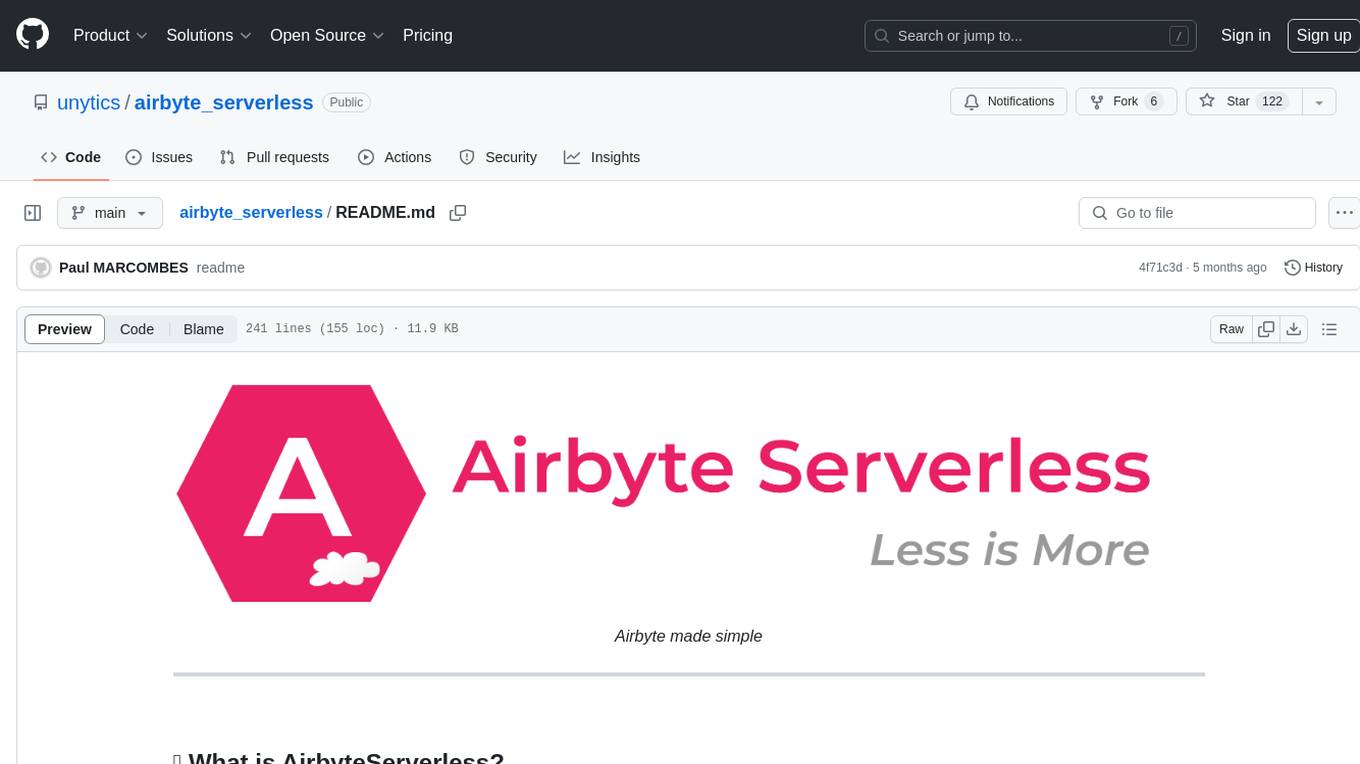
airbyte_serverless
AirbyteServerless is a lightweight tool designed to simplify the management of Airbyte connectors. It offers a serverless mode for running connectors, allowing users to easily move data from any source to their data warehouse. Unlike the full Airbyte-Open-Source-Platform, AirbyteServerless focuses solely on the Extract-Load process without a UI, database, or transform layer. It provides a CLI tool, 'abs', for managing connectors, creating connections, running jobs, selecting specific data streams, handling secrets securely, and scheduling remote runs. The tool is scalable, allowing independent deployment of multiple connectors. It aims to streamline the connector management process and provide a more agile alternative to the comprehensive Airbyte platform.
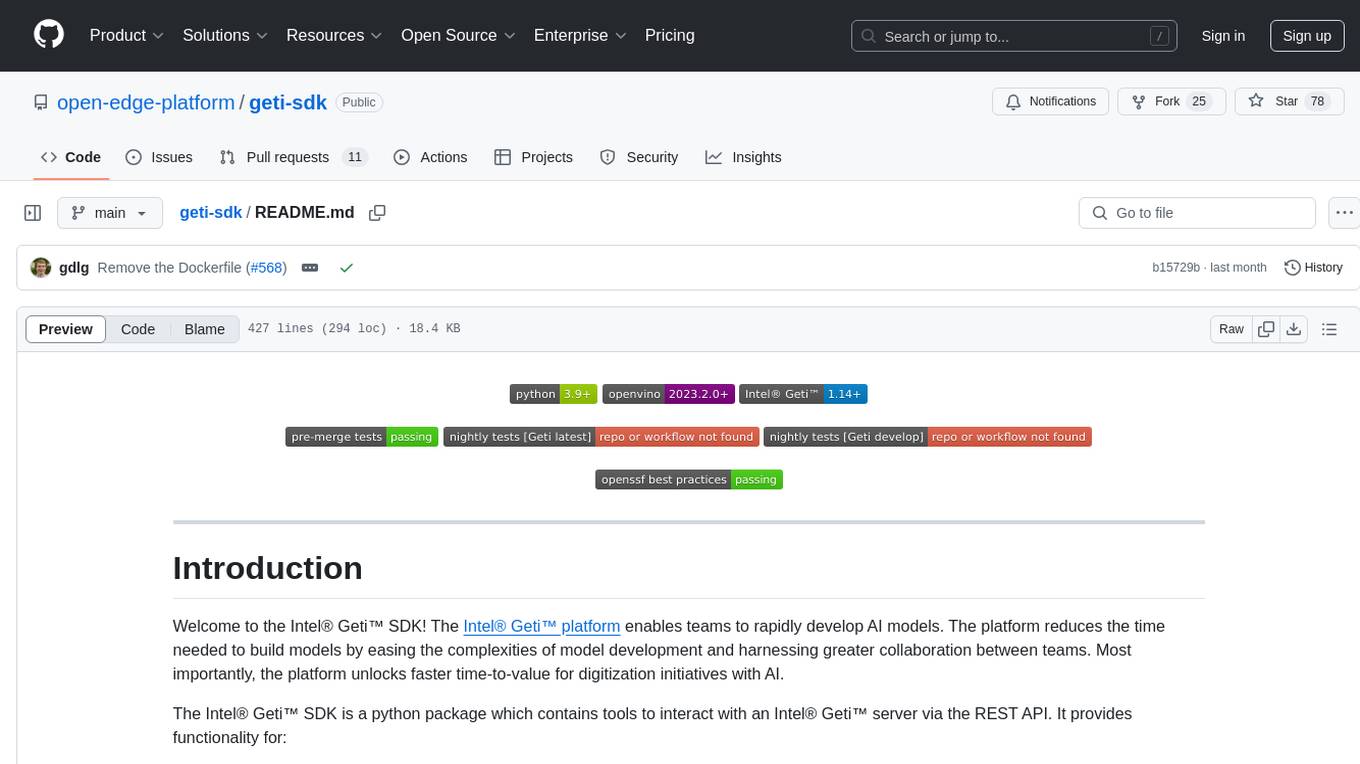
geti-sdk
The Intel® Geti™ SDK is a python package that enables teams to rapidly develop AI models by easing the complexities of model development and fostering collaboration. It provides tools to interact with an Intel® Geti™ server via the REST API, allowing for project creation, downloading, uploading, deploying for local inference with OpenVINO, configuration management, training job monitoring, media upload, and prediction. The repository also includes tutorial-style Jupyter notebooks demonstrating SDK usage.
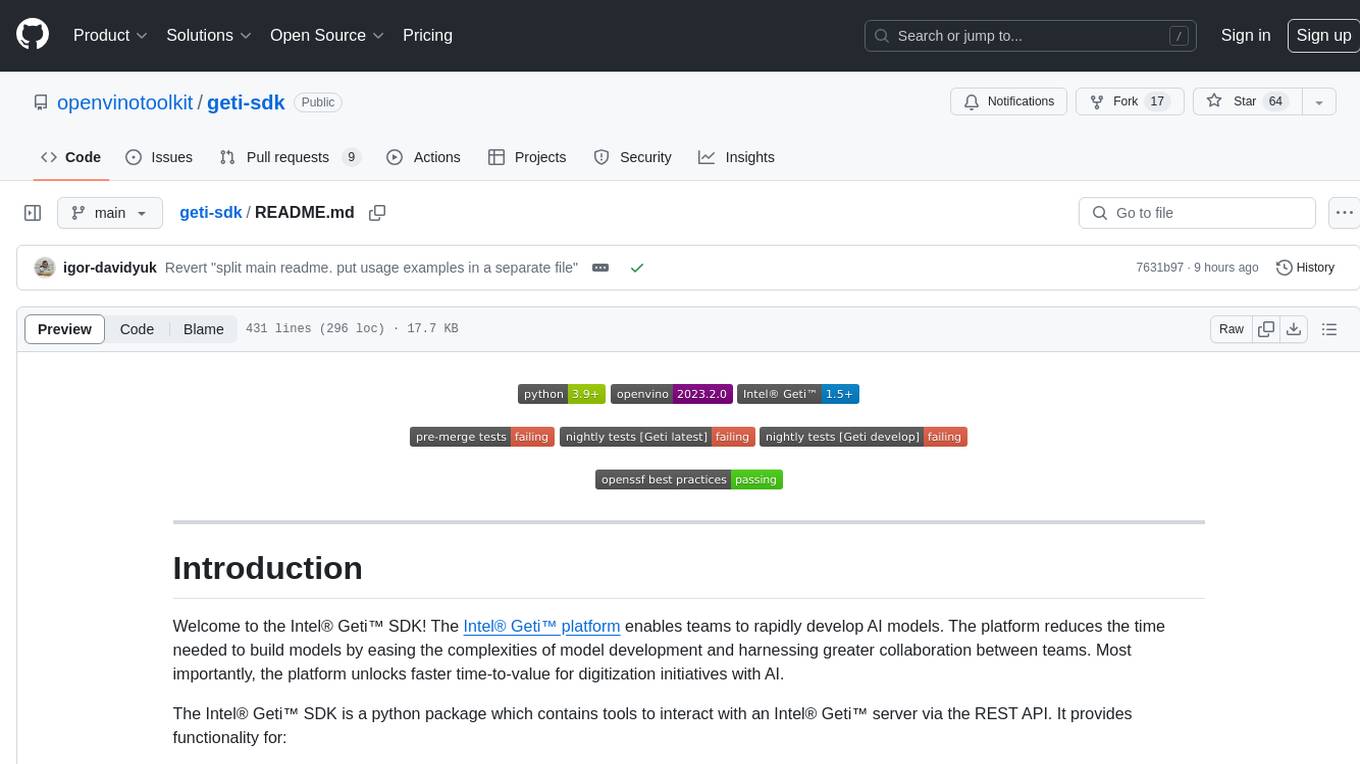
geti-sdk
The Intel® Geti™ SDK is a python package that enables teams to rapidly develop AI models by easing the complexities of model development and enhancing collaboration between teams. It provides tools to interact with an Intel® Geti™ server via the REST API, allowing for project creation, downloading, uploading, deploying for local inference with OpenVINO, setting project and model configuration, launching and monitoring training jobs, and media upload and prediction. The SDK also includes tutorial-style Jupyter notebooks demonstrating its usage.
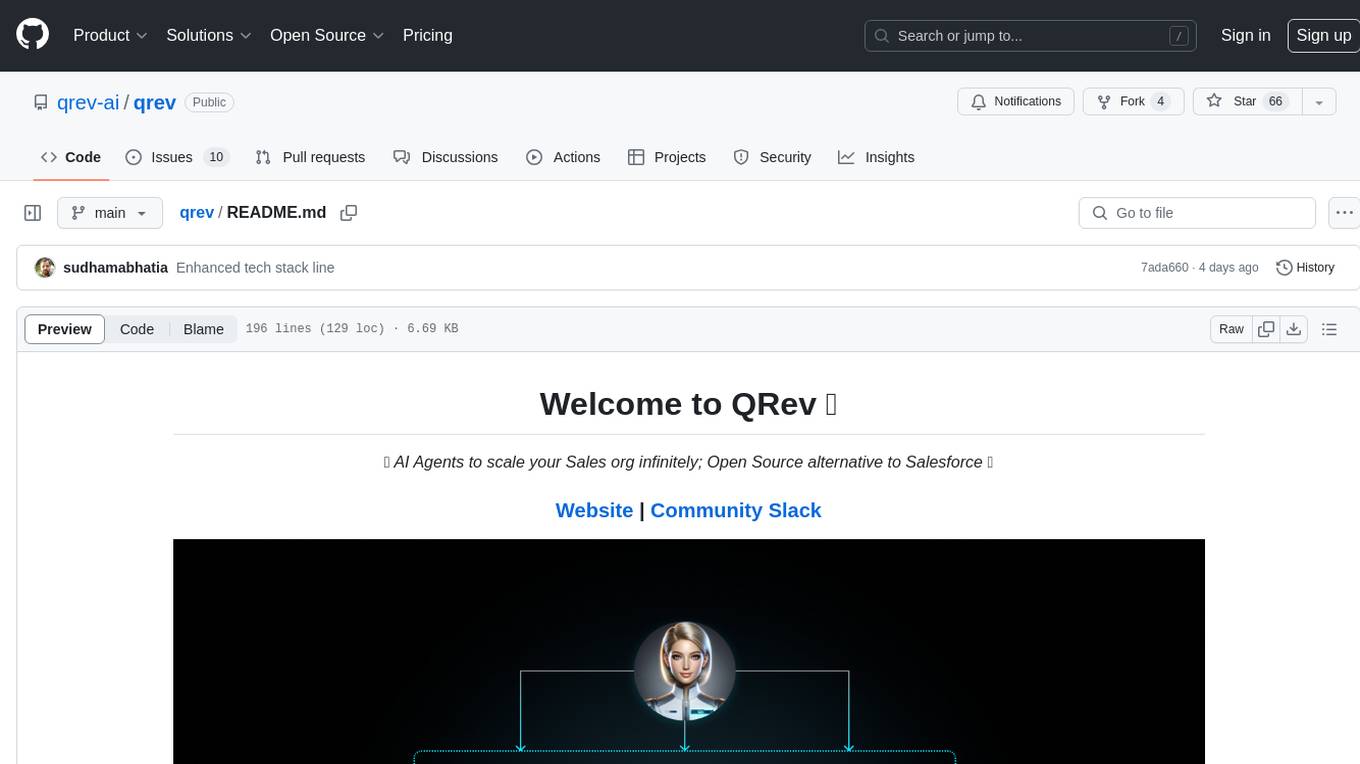
qrev
QRev is an open-source alternative to Salesforce, offering AI agents to scale sales organizations infinitely. It aims to provide digital workers for various sales roles or a superagent named Qai. The tech stack includes TypeScript for frontend, NodeJS for backend, MongoDB for app server database, ChromaDB for vector database, SQLite for AI server SQL relational database, and Langchain for LLM tooling. The tool allows users to run client app, app server, and AI server components. It requires Node.js and MongoDB to be installed, and provides detailed setup instructions in the README file.

Sentient
Sentient is a personal, private, and interactive AI companion developed by Existence. The project aims to build a completely private AI companion that is deeply personalized and context-aware of the user. It utilizes automation and privacy to create a true companion for humans. The tool is designed to remember information about the user and use it to respond to queries and perform various actions. Sentient features a local and private environment, MBTI personality test, integrations with LinkedIn, Reddit, and more, self-managed graph memory, web search capabilities, multi-chat functionality, and auto-updates for the app. The project is built using technologies like ElectronJS, Next.js, TailwindCSS, FastAPI, Neo4j, and various APIs.
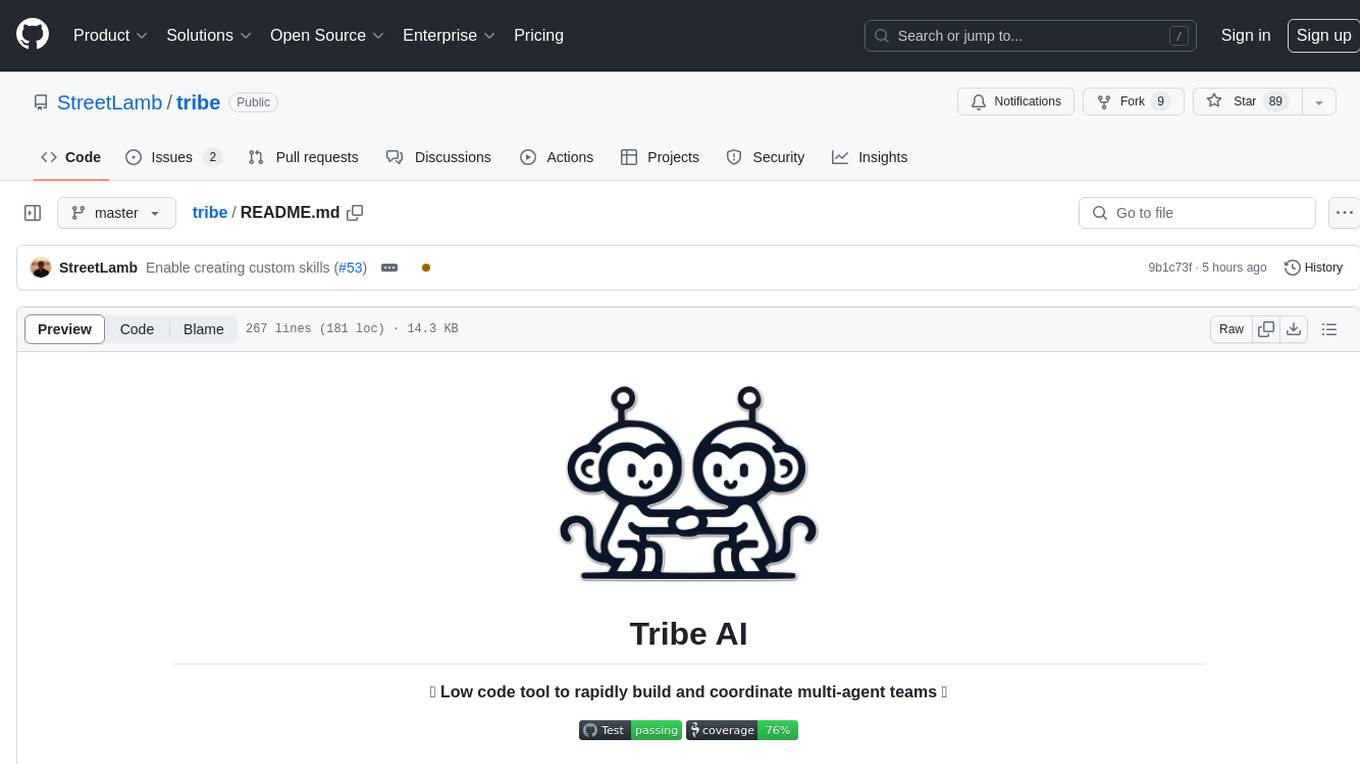
tribe
Tribe AI is a low code tool designed to rapidly build and coordinate multi-agent teams. It leverages the langgraph framework to customize and coordinate teams of agents, allowing tasks to be split among agents with different strengths for faster and better problem-solving. The tool supports persistent conversations, observability, tool calling, human-in-the-loop functionality, easy deployment with Docker, and multi-tenancy for managing multiple users and teams.
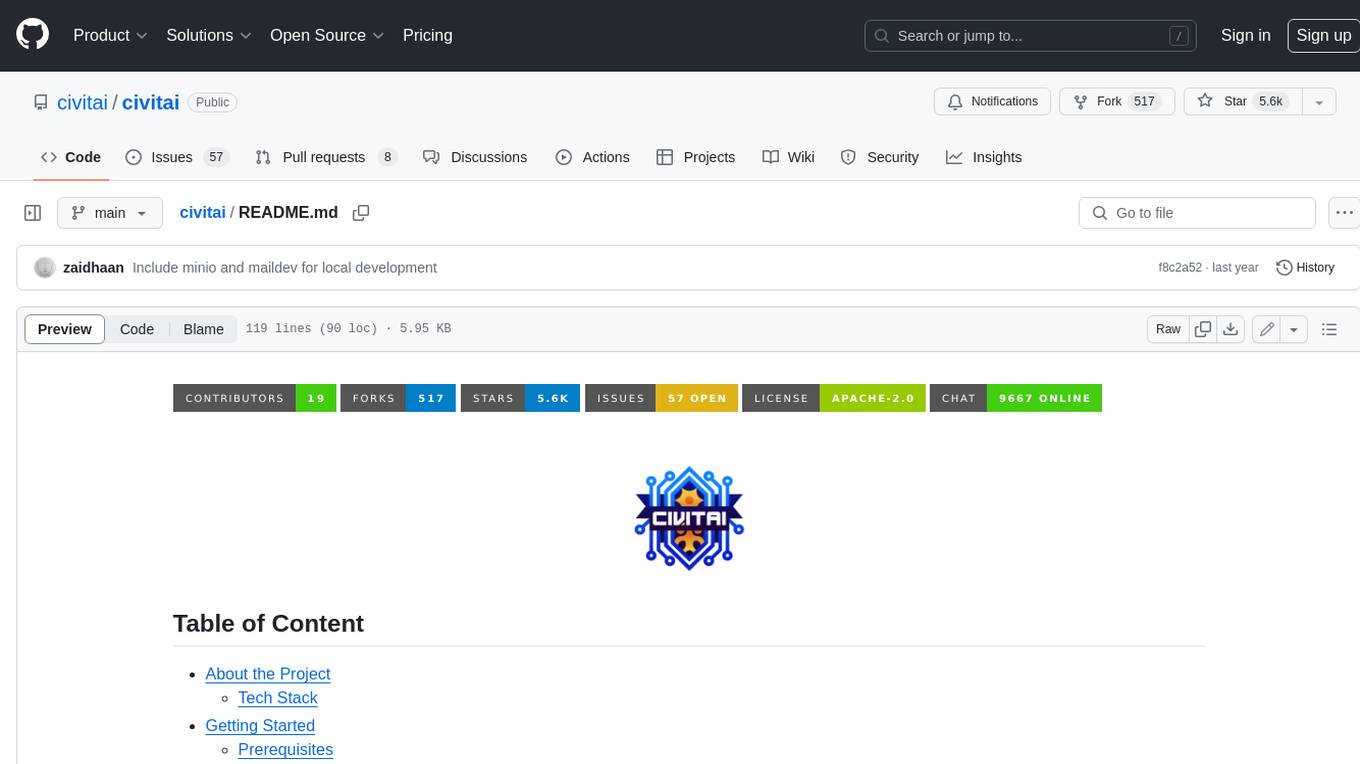
civitai
Civitai is a platform where people can share their stable diffusion models (textual inversions, hypernetworks, aesthetic gradients, VAEs, and any other crazy stuff people do to customize their AI generations), collaborate with others to improve them, and learn from each other's work. The platform allows users to create an account, upload their models, and browse models that have been shared by others. Users can also leave comments and feedback on each other's models to facilitate collaboration and knowledge sharing.
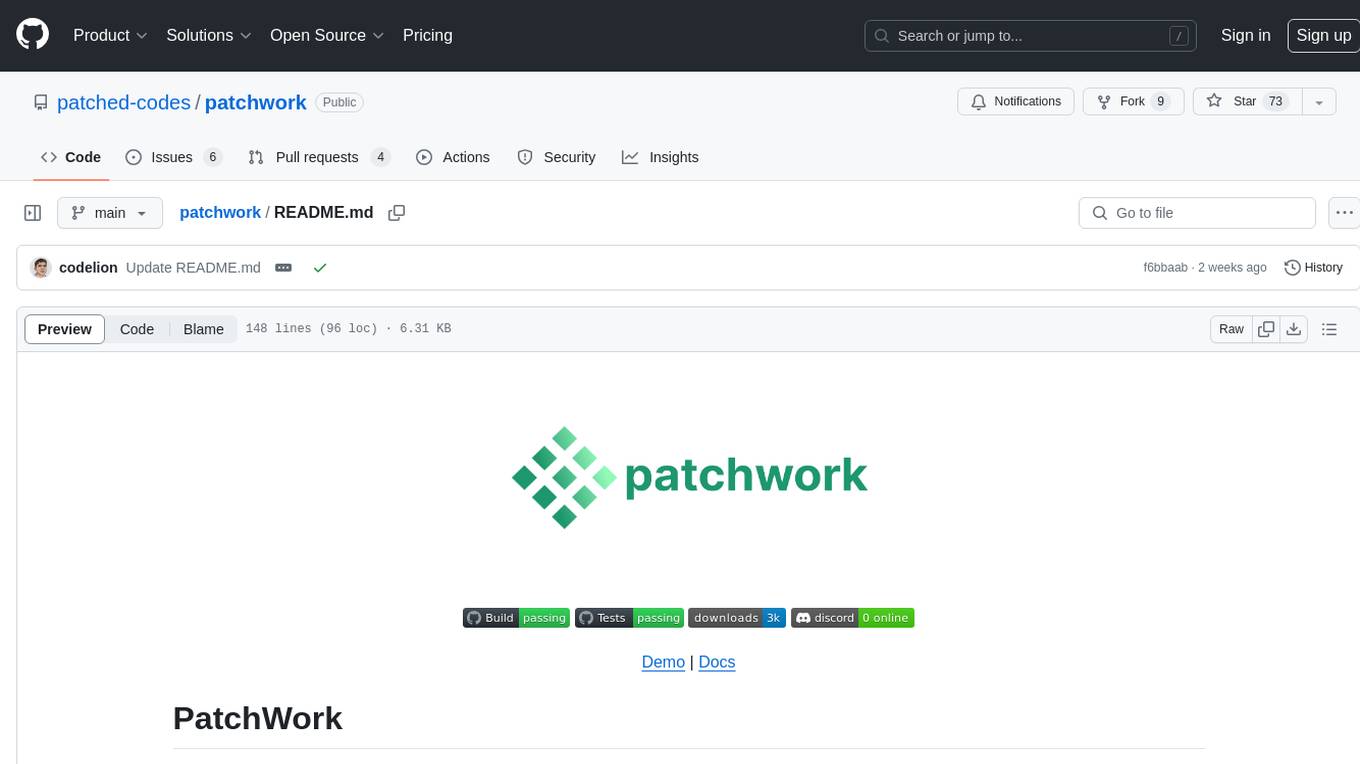
patchwork
PatchWork is an open-source framework designed for automating development tasks using large language models. It enables users to automate workflows such as PR reviews, bug fixing, security patching, and more through a self-hosted CLI agent and preferred LLMs. The framework consists of reusable atomic actions called Steps, customizable LLM prompts known as Prompt Templates, and LLM-assisted automations called Patchflows. Users can run Patchflows locally in their CLI/IDE or as part of CI/CD pipelines. PatchWork offers predefined patchflows like AutoFix, PRReview, GenerateREADME, DependencyUpgrade, and ResolveIssue, with the flexibility to create custom patchflows. Prompt templates are used to pass queries to LLMs and can be customized. Contributions to new patchflows, steps, and the core framework are encouraged, with chat assistants available to aid in the process. The roadmap includes expanding the patchflow library, introducing a debugger and validation module, supporting large-scale code embeddings, parallelization, fine-tuned models, and an open-source GUI. PatchWork is licensed under AGPL-3.0 terms, while custom patchflows and steps can be shared using the Apache-2.0 licensed patchwork template repository.
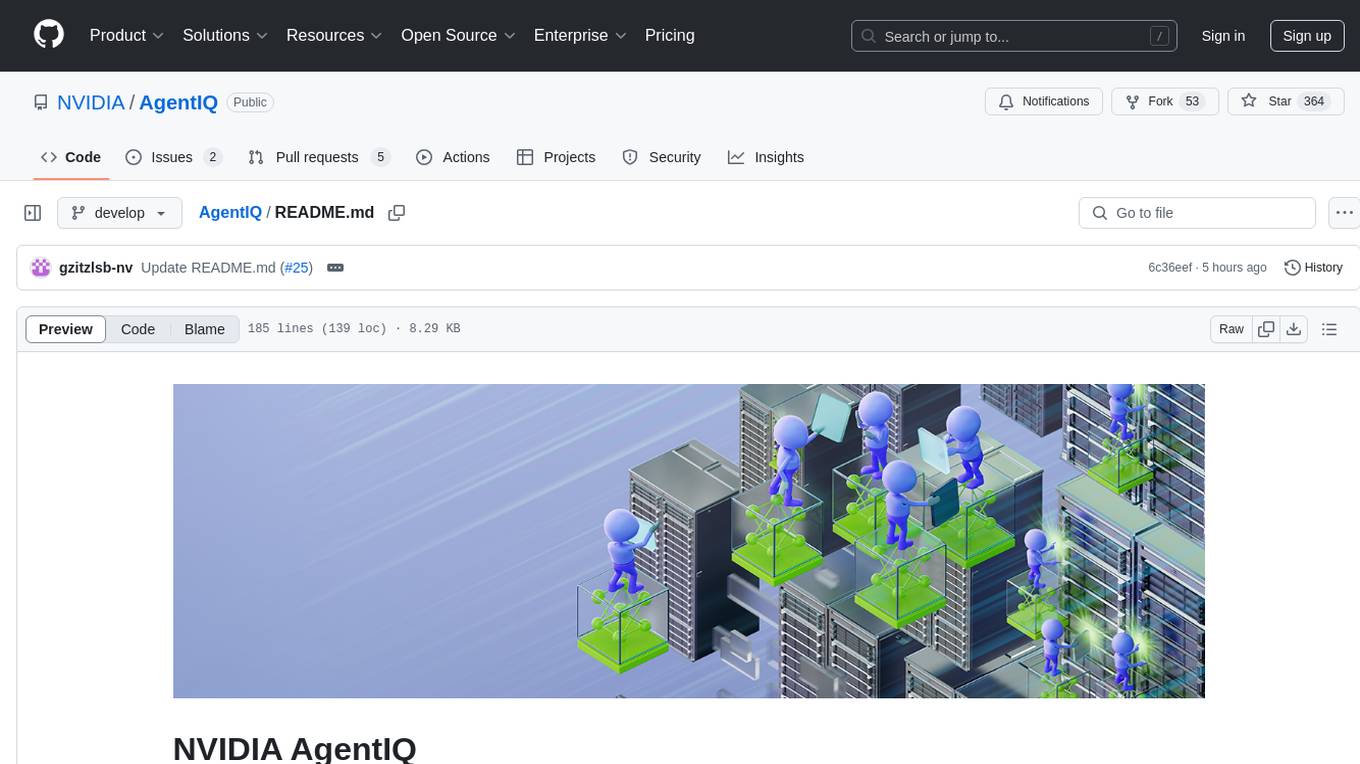
AgentIQ
AgentIQ is a flexible library designed to seamlessly integrate enterprise agents with various data sources and tools. It enables true composability by treating agents, tools, and workflows as simple function calls. With features like framework agnosticism, reusability, rapid development, profiling, observability, evaluation system, user interface, and MCP compatibility, AgentIQ empowers developers to move quickly, experiment freely, and ensure reliability across agent-driven projects.

nlux
nlux is an open-source Javascript and React JS library that makes it super simple to integrate powerful large language models (LLMs) like ChatGPT into your web app or website. With just a few lines of code, you can add conversational AI capabilities and interact with your favourite LLM.

telemetry-airflow
This repository codifies the Airflow cluster that is deployed at workflow.telemetry.mozilla.org (behind SSO) and commonly referred to as "WTMO" or simply "Airflow". Some links relevant to users and developers of WTMO: * The `dags` directory in this repository contains some custom DAG definitions * Many of the DAGs registered with WTMO don't live in this repository, but are instead generated from ETL task definitions in bigquery-etl * The Data SRE team maintains a WTMO Developer Guide (behind SSO)
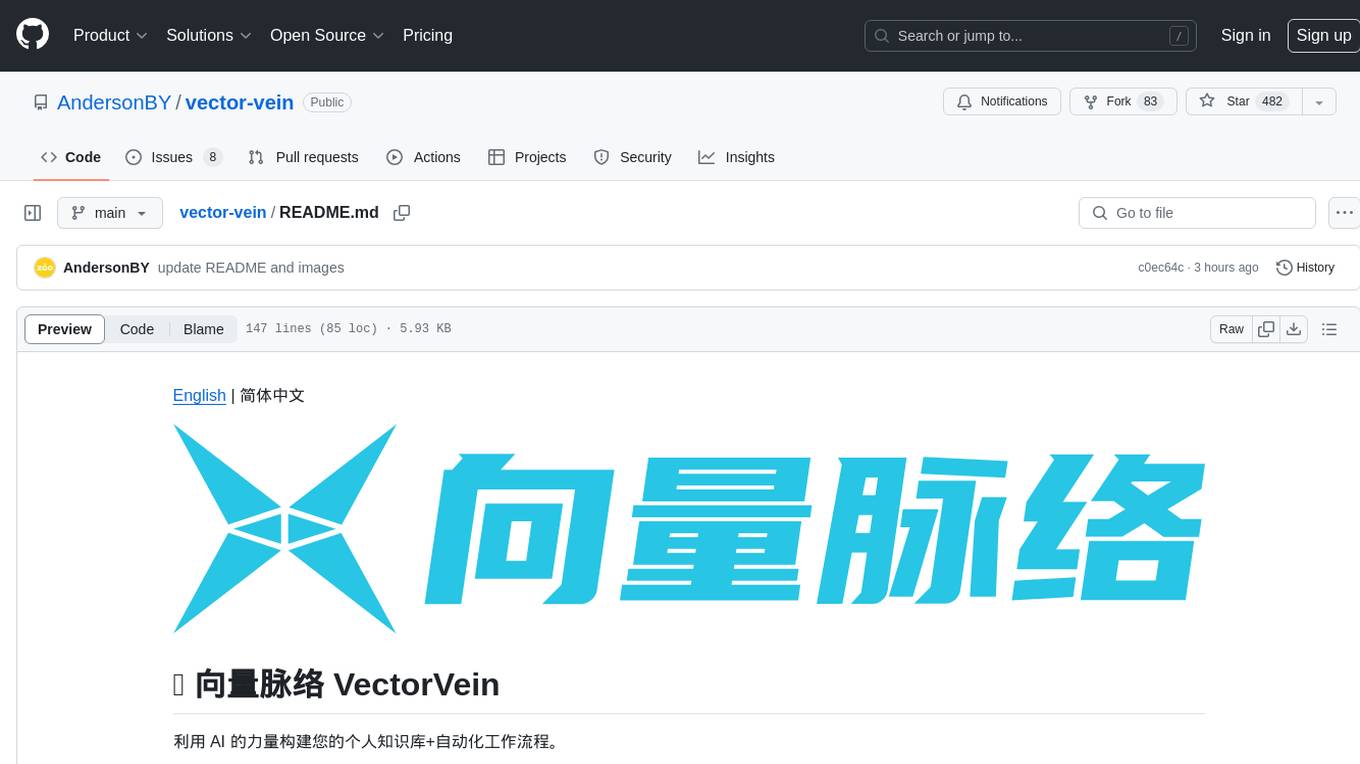
vector-vein
VectorVein is a no-code AI workflow software inspired by LangChain and langflow, aiming to combine the powerful capabilities of large language models and enable users to achieve intelligent and automated daily workflows through simple drag-and-drop actions. Users can create powerful workflows without the need for programming, automating all tasks with ease. The software allows users to define inputs, outputs, and processing methods to create customized workflow processes for various tasks such as translation, mind mapping, summarizing web articles, and automatic categorization of customer reviews.
For similar tasks

actions
Sema4.ai Action Server is a tool that allows users to build semantic actions in Python to connect AI agents with real-world applications. It enables users to create custom actions, skills, loaders, and plugins that securely connect any AI Assistant platform to data and applications. The tool automatically creates and exposes an API based on function declaration, type hints, and docstrings by adding '@action' to Python scripts. It provides an end-to-end stack supporting various connections between AI and user's apps and data, offering ease of use, security, and scalability.
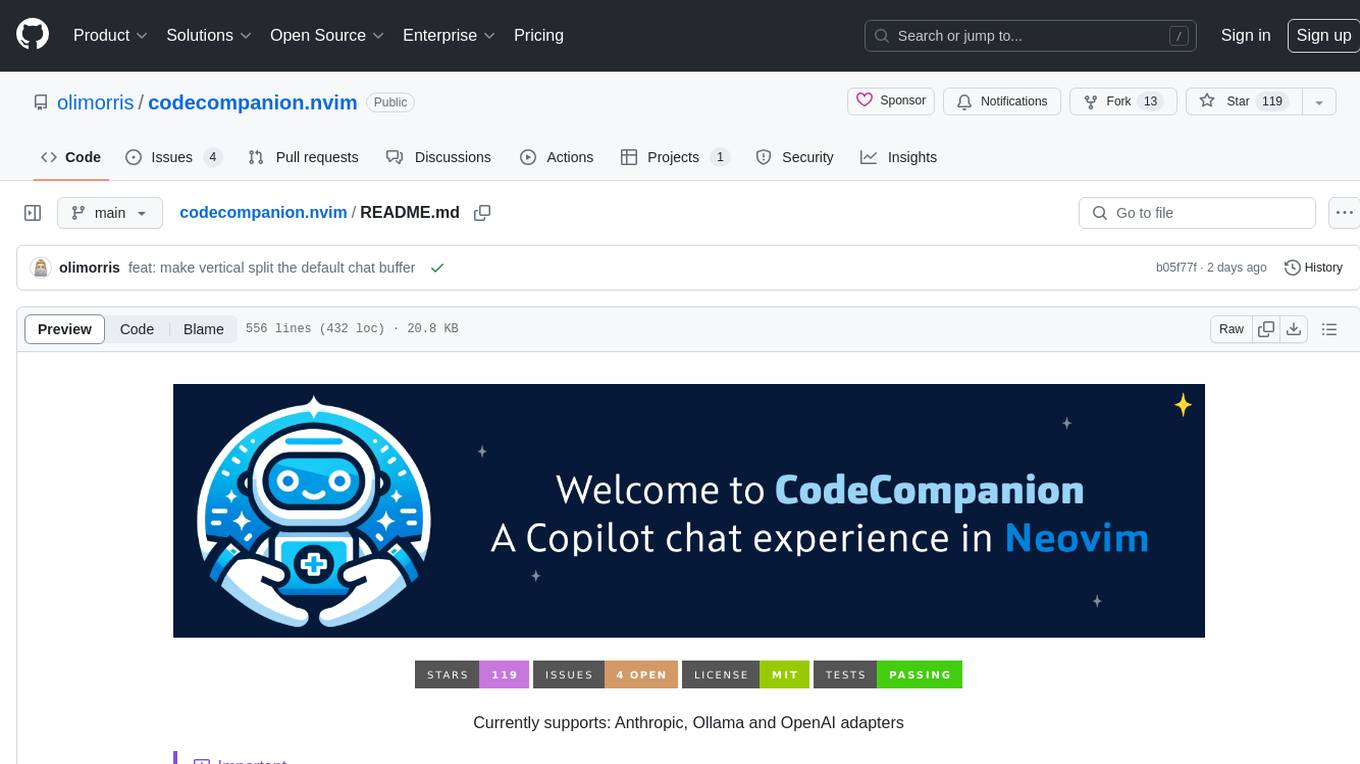
codecompanion.nvim
CodeCompanion.nvim is a Neovim plugin that provides a Copilot Chat experience, adapter support for various LLMs, agentic workflows, inline code creation and modification, built-in actions for language prompts and error fixes, custom actions creation, async execution, and more. It supports Anthropic, Ollama, and OpenAI adapters. The plugin is primarily developed for personal workflows with no guarantees of regular updates or support. Users can customize the plugin to their needs by forking the project.
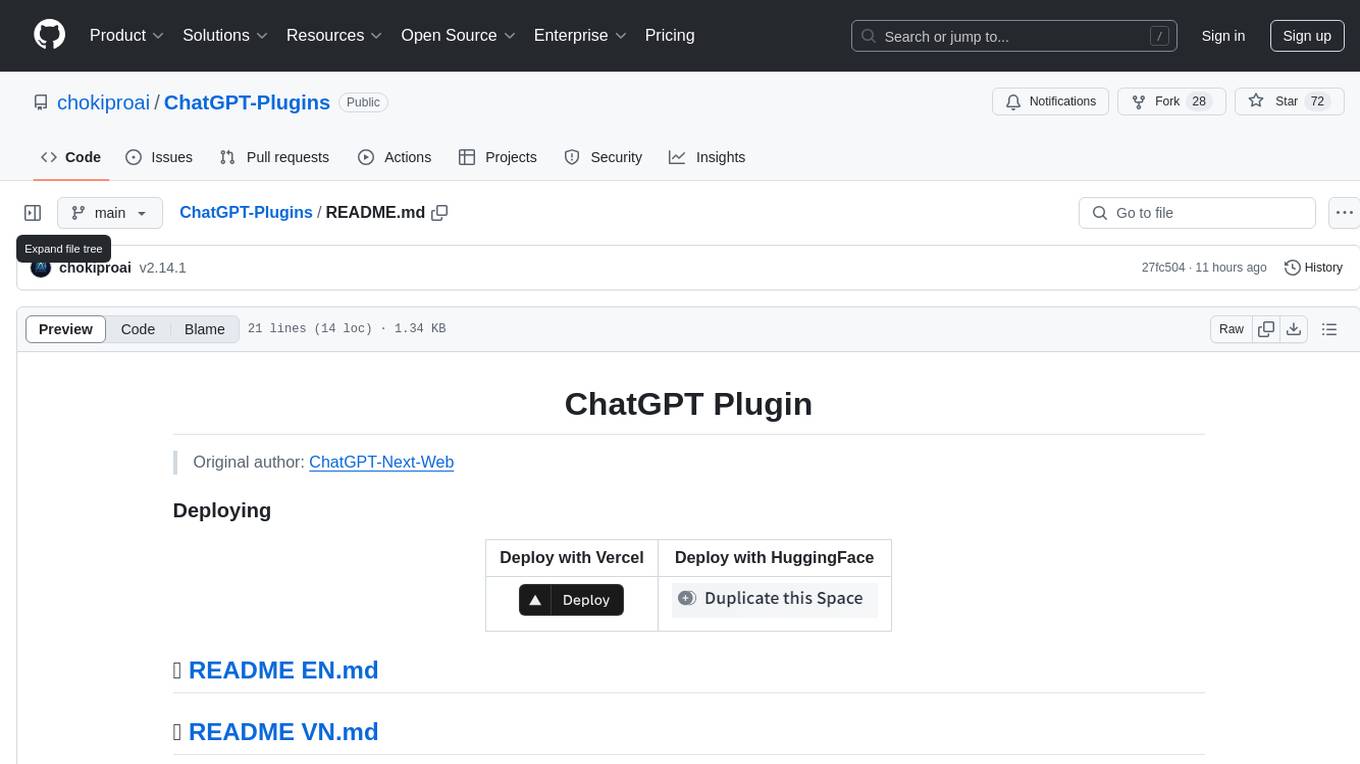
ChatGPT-Plugins
ChatGPT-Plugins is a repository containing plugins for ChatGPT-Next-Web. These plugins provide additional functionalities and features to enhance the ChatGPT experience. Users can easily deploy these plugins using Vercel or HuggingFace. The repository includes README files in English and Vietnamese for user guidance.
For similar jobs

promptflow
**Prompt flow** is a suite of development tools designed to streamline the end-to-end development cycle of LLM-based AI applications, from ideation, prototyping, testing, evaluation to production deployment and monitoring. It makes prompt engineering much easier and enables you to build LLM apps with production quality.

deepeval
DeepEval is a simple-to-use, open-source LLM evaluation framework specialized for unit testing LLM outputs. It incorporates various metrics such as G-Eval, hallucination, answer relevancy, RAGAS, etc., and runs locally on your machine for evaluation. It provides a wide range of ready-to-use evaluation metrics, allows for creating custom metrics, integrates with any CI/CD environment, and enables benchmarking LLMs on popular benchmarks. DeepEval is designed for evaluating RAG and fine-tuning applications, helping users optimize hyperparameters, prevent prompt drifting, and transition from OpenAI to hosting their own Llama2 with confidence.

MegaDetector
MegaDetector is an AI model that identifies animals, people, and vehicles in camera trap images (which also makes it useful for eliminating blank images). This model is trained on several million images from a variety of ecosystems. MegaDetector is just one of many tools that aims to make conservation biologists more efficient with AI. If you want to learn about other ways to use AI to accelerate camera trap workflows, check out our of the field, affectionately titled "Everything I know about machine learning and camera traps".

leapfrogai
LeapfrogAI is a self-hosted AI platform designed to be deployed in air-gapped resource-constrained environments. It brings sophisticated AI solutions to these environments by hosting all the necessary components of an AI stack, including vector databases, model backends, API, and UI. LeapfrogAI's API closely matches that of OpenAI, allowing tools built for OpenAI/ChatGPT to function seamlessly with a LeapfrogAI backend. It provides several backends for various use cases, including llama-cpp-python, whisper, text-embeddings, and vllm. LeapfrogAI leverages Chainguard's apko to harden base python images, ensuring the latest supported Python versions are used by the other components of the stack. The LeapfrogAI SDK provides a standard set of protobuffs and python utilities for implementing backends and gRPC. LeapfrogAI offers UI options for common use-cases like chat, summarization, and transcription. It can be deployed and run locally via UDS and Kubernetes, built out using Zarf packages. LeapfrogAI is supported by a community of users and contributors, including Defense Unicorns, Beast Code, Chainguard, Exovera, Hypergiant, Pulze, SOSi, United States Navy, United States Air Force, and United States Space Force.

llava-docker
This Docker image for LLaVA (Large Language and Vision Assistant) provides a convenient way to run LLaVA locally or on RunPod. LLaVA is a powerful AI tool that combines natural language processing and computer vision capabilities. With this Docker image, you can easily access LLaVA's functionalities for various tasks, including image captioning, visual question answering, text summarization, and more. The image comes pre-installed with LLaVA v1.2.0, Torch 2.1.2, xformers 0.0.23.post1, and other necessary dependencies. You can customize the model used by setting the MODEL environment variable. The image also includes a Jupyter Lab environment for interactive development and exploration. Overall, this Docker image offers a comprehensive and user-friendly platform for leveraging LLaVA's capabilities.

carrot
The 'carrot' repository on GitHub provides a list of free and user-friendly ChatGPT mirror sites for easy access. The repository includes sponsored sites offering various GPT models and services. Users can find and share sites, report errors, and access stable and recommended sites for ChatGPT usage. The repository also includes a detailed list of ChatGPT sites, their features, and accessibility options, making it a valuable resource for ChatGPT users seeking free and unlimited GPT services.

TrustLLM
TrustLLM is a comprehensive study of trustworthiness in LLMs, including principles for different dimensions of trustworthiness, established benchmark, evaluation, and analysis of trustworthiness for mainstream LLMs, and discussion of open challenges and future directions. Specifically, we first propose a set of principles for trustworthy LLMs that span eight different dimensions. Based on these principles, we further establish a benchmark across six dimensions including truthfulness, safety, fairness, robustness, privacy, and machine ethics. We then present a study evaluating 16 mainstream LLMs in TrustLLM, consisting of over 30 datasets. The document explains how to use the trustllm python package to help you assess the performance of your LLM in trustworthiness more quickly. For more details about TrustLLM, please refer to project website.

AI-YinMei
AI-YinMei is an AI virtual anchor Vtuber development tool (N card version). It supports fastgpt knowledge base chat dialogue, a complete set of solutions for LLM large language models: [fastgpt] + [one-api] + [Xinference], supports docking bilibili live broadcast barrage reply and entering live broadcast welcome speech, supports Microsoft edge-tts speech synthesis, supports Bert-VITS2 speech synthesis, supports GPT-SoVITS speech synthesis, supports expression control Vtuber Studio, supports painting stable-diffusion-webui output OBS live broadcast room, supports painting picture pornography public-NSFW-y-distinguish, supports search and image search service duckduckgo (requires magic Internet access), supports image search service Baidu image search (no magic Internet access), supports AI reply chat box [html plug-in], supports AI singing Auto-Convert-Music, supports playlist [html plug-in], supports dancing function, supports expression video playback, supports head touching action, supports gift smashing action, supports singing automatic start dancing function, chat and singing automatic cycle swing action, supports multi scene switching, background music switching, day and night automatic switching scene, supports open singing and painting, let AI automatically judge the content.



